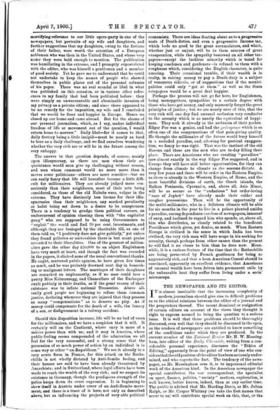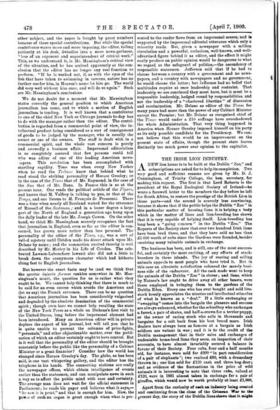THE NEWSPAPER AND ITS EDITOR.
TT is almost inevitable that the increasing complexity of
modern journalism should give rise to difficult problems as to the ethical relations between the editor of a journal and the proprietors thereof. The recent dismissal or resignation of certain editors on account of the views they thought it right to express seemed to bring the question to a serious issue. It is well that these problems should be thoroughly discussed, even well that they should be discussed in the open, as the readers of newspapers are entitled to know something of the conditions under which they are produced. In the current number of the National Review Mr. H. W. Massing- ham, late editor of the Daily Chronicle, writing from a con- siderable personal experience, discusses the " Ethics of Editing," apparently from the point of view of one who con- siders that the old position of the editor has been seriously under- mined, and who regrets the fact. The tendency of the news- paper, as Mr. Massingham sees it, is to impersonal editorial work of the American kind. In the American newspaper the special contributor, the war correspondent, the specialist on sport, finance, politics, " society" matters, exploration, is well known, better known, indeed, than at any earlier time. The public is advised that Mr. Harding Davis, or Mr. Julian Ralph, or Mr. Caspar Whitney (we take the first names that occur to us) will contribute special work on this, that, or the other subject, and the paper is bought by great numbers because of these special contributions. But while the special contributor waxes more and more imposing, the editor, toiling patiently at his desk, dwindles into a mere news-gatherer, less of an exponent and superintendent of critical work." This, as we understand it, is Mr. Massingham's critical view of the situation, and he has arrived apparently at the con- clusion that the editor has no longer any real function to perform. "If be is worked out, if, as with the eyes of the fish that have taken to swimming in caverns, nature has no farther use for him, in Heaven's name let him go. The world did very well without him once, and will do so again." Such are Mr. Massingham's conclusions.
We do not doubt for a moment that Mr. Me.ssingliam states correctly the general position to which American journalism has come, and to which a section of English journalism is tending. It is well known that a contributor to one of the chief New York or Chicago journals to-day has to do with the manager rather than the editor. The contri- bution is regarded from a commercial point of view, the in- tellectual product being considered as a sort of consignment of goods to be judged by the manager, who is usually the owner or one of the owners. The staff is dealt with in a commercial spirit, and the whole vast concern is purely and avowedly a business affair. Impersonal editorialism is so completely assured that few persons could tell who was editor of one of the leading American news- • )apers. This revolution has been accomplished with startling rapidity. Time was when every New Yorker when he read the Tribune knew that behind what he read stood the striking personality of Horace Greeley; or in the case of the Times that of Mr. Raymond, in the case of the Sun that of Mr. Dana. In France this is so at the present hour. One reads the political article of the Figaro, and knows that M. Palfrey is talking to you, or that of the Temps, and one listens to M. Francois de Pressense. There was a time when nearly all Scotland waited for the utterance of Russell of the Scotsman ; and in a lesser degree a large part of the North of England a generation ago hung upon the daily leader of the late Mr. Joseph Cowen. On the other hand, we think Mr. Massingham scarcely recognises the fact that journalism in England, even so far as the editor is con- cerned, has grown more rather than less personal. The personality of the editor of the Times, e.g., was a sort of veiled mystery until Cobden made his direct attack upon Mr. Delane by name ; and the commotion excited thereby is well described by Mr. Morley in his Life of Cobden. The cele- brated Lawson-Labonchere lawsuit also did not a little to break down the anonymous character which had hitherto clung fast to English journalism.
But however the exact facts may be (and we think that the spretae irnjuria formae rankles somewhat in Mr. Mas- singham's mind), the question for us is rather what they ought to be. We cannot help thinking that there is much to be said for an even coarse which avoids the American and (let us say) the French extremes. There can be no question that American journalism has been considerably vulgarised and degraded by the absolute domination of the commercial spirit ; though even here we cannot help recalling the state of the New York Press as a whole on Dickens's first visit to the United States, long before the impersonal element had been introduced. Many an American editor will in private deplore the aspect of his journal, but will tell you that he is quite unable to prevent the columns of prize-fights, "personals," and other objectionable matter, over the publi- cation of which an editor certainly ought to have control. But is it well that the personality of the editor should be brought constantly before the public like the personality of a Cabinet Minister or a great financier? Consider how the world has changed since Horace Greeley's day. The globe, as has been said, is one vast whispering gallery, and the editor has the telephone in his bands. The connecting stations are really the newspaper offices, which obtain intelligence of events earlier than the statesmen, and can manipulate news in such a way as to affect the public mind with ease and certainty. The average man does not wait for the official statement in Parliament; be reads his paper and believes what it says,— " he saw it in print," and that is enough for him. Now, the power of such an organ is great enough when what is pre-
sented to the reader flows from an impersonal source, and is supported by the impersonal editorial utterance which only a minority reads. But, given a newspaper with a million circulation and a powerful, audacious, well-known, and well- advertised figure behind it as editor, and the effect it might easily produce on public opinion would be dangerous to what we regard as the safeguard of politics,—the ascendency of responsible statesmen. Jefferson said that if he had to choose between a country with a government and no news- papers, and a country with newspapers and no government, he would choose the latter; but Jefferson had no belief that multitudes require at once leadership and restraint. That leadership we are convinced they must have, but it must be a responsible leadership, hedged round by responsibilities, and not the leadership of a " chartered libertine" of discussion and recrimination. Mr. Delane as editor of the Times for many years had more than the power of any Cabinet Minister except the Premier; but Mr. Delane as recognised chief of the Times would under a £10 suffrage have overshadowed the whole Administration. That very thing happened in America when Horace Greeley imposed himself on his party as its only possible candidate for the Presidency. We can- not believe that this would be an improvement on the present state of affairs, though the present state leaves distinctly too much power over opinion to the capitalist.







































 Previous page
Previous page